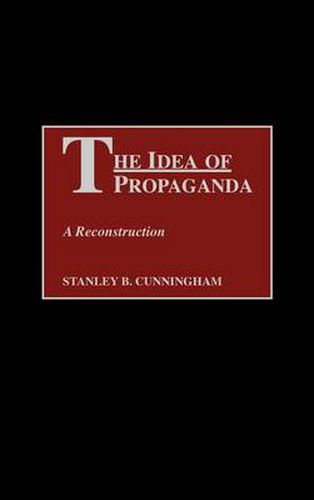Readings Newsletter
Become a Readings Member to make your shopping experience even easier.
Sign in or sign up for free!
You’re not far away from qualifying for FREE standard shipping within Australia
You’ve qualified for FREE standard shipping within Australia
The cart is loading…






To understand properly the use of propaganda, it is necessary to move beyond the conventional, largely descriptive treatments that have been the scholarly norm, and to move deeply into a sustained theoretical analysis of the concept in terms of its primary cognitive and ethical deficits. Through a sequential consideration of the epistemology, ethics, and metaphysics of propaganda–that is, one that emerges from a historical review of theories and definitions of the subject–author Stanley B. Cunningham provides a radical new window on a much-discussed discipline. He aims to secure a concept of propaganda that reflects the complexity and sophistication of contemporary mass persuasion practices, while avoiding the trivializations and cliches that mark much of propaganda scholarship. Utilizing an assortment of philosophical analyses and arguments, Cunningham contends that the culture of propaganda is primarily and originally rooted in a wide range of epistemological disservices–that, indeed, propaganda is neither ethically neutral nor indeterminate, and that its lack of ethics composes its very definition. Eschewing the methodology of social science, this radical study represents the first-ever systematic and philosophically structured approach in the 80-year history of propaganda analysis.
$9.00 standard shipping within Australia
FREE standard shipping within Australia for orders over $100.00
Express & International shipping calculated at checkout
To understand properly the use of propaganda, it is necessary to move beyond the conventional, largely descriptive treatments that have been the scholarly norm, and to move deeply into a sustained theoretical analysis of the concept in terms of its primary cognitive and ethical deficits. Through a sequential consideration of the epistemology, ethics, and metaphysics of propaganda–that is, one that emerges from a historical review of theories and definitions of the subject–author Stanley B. Cunningham provides a radical new window on a much-discussed discipline. He aims to secure a concept of propaganda that reflects the complexity and sophistication of contemporary mass persuasion practices, while avoiding the trivializations and cliches that mark much of propaganda scholarship. Utilizing an assortment of philosophical analyses and arguments, Cunningham contends that the culture of propaganda is primarily and originally rooted in a wide range of epistemological disservices–that, indeed, propaganda is neither ethically neutral nor indeterminate, and that its lack of ethics composes its very definition. Eschewing the methodology of social science, this radical study represents the first-ever systematic and philosophically structured approach in the 80-year history of propaganda analysis.